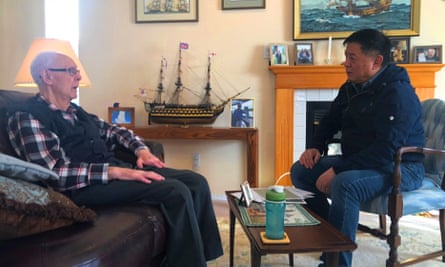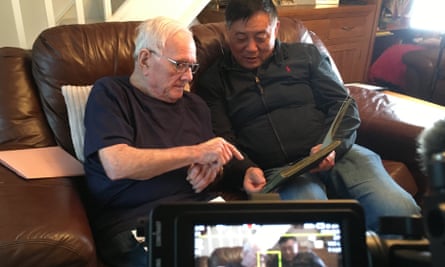A little-known tragedy from the second world war is the subject of a documentary that has been a surprise hit in China and is the country’s pick for two Academy Awards – although it has already been disqualified from one of the categories.
On Monday, it was revealed that The Sinking of the Lisbon Maru, which had been selected by China as its entry for the best international feature prize at the Oscars, had been deemed ineligible. The competition’s rules state that a film in that category must have “a predominantly (more than 50%) non-English dialogue track”.
“I didn’t know the rules at all,” explains Fang Li, the director, who says it was selected by China’s official committee without his knowledge. Fang says that the definition of “dialogue” was unclear, and that by some definitions his film, which interviews people in China, the UK and Japan, could still be considered to be 50% non-English.
 View image in fullscreen
View image in fullscreen
The Sinking of the Lisbon Maru tells the story of a Japanese ship that was used to transport 1,816 British prisoners of war from Hong Kong to Japan during the second world war. In October 1942, as the unmarked vessel was sailing through the East China Sea, it was torpedoed by the US navy. Hundreds of prisoners drowned or were shot by Japanese troops as they tried to escape. But more than 300 were rescued by Chinese fishers who spotted the smoke and debris from an archipelago on China’s east coast (most were later recaptured by the Japanese).
Fang, a businessman turned film director, first learned about the incident when he overheard a fisher on Dongji island, part of the Zhoushan archipelago that more than 80 years ago was the site of the rescue mission, mention the existence of a sunken ship from the second world war in the nearby waters. Fang set out to find the ship’s remains, but soon the project became about telling the stories of the people on board. “I wanted all those 828 men to not be forgotten,” says Fang, the film’s director, producer, and host, referring to the men who didn’t survive.
With many of the people involved in the incident since deceased, piecing together the story was a struggle. At one point, Fang enlisted the help of a private detective in Tokyo to track down the children of Kyoda Shigeru, the captain of the Lisbon Maru, who in 1947 was convicted of war crimes for his role in the incident. PoWs had been forced into the ship’s hold when the vessel was sinking, causing many to die by suffocation as well as drowning. His children, now elderly themselves, say that their father never mentioned the incident. “Maybe at the thought of so many deaths, he was full of remorse,” says Shigeru’s son.
 View image in fullscreen
View image in fullscreen
To find the British survivors, Fang took a different approach. In 2018, he placed full-page advertisements in British newspapers - including the Guardian and the Observer – calling out for any surviving PoWs or their relatives to get in touch. Fang says he received more than 380 responses.
Although the film features “shocking Japanese violence”, the film is about “touching family stories”, Fang says. But nearly 80 years after the war, the countries involved in the Lisbon Maru tragedy – the US, the UK, China and Japan – still do not all have easy relationships. In recent months, there has been a spate of anti-Japanese nationalism in China, including two separate stabbing incidents. In one of the attacks, a 10-year-old Japanese boy in the southern Chinese city of Shenzhen was fatally stabbed on the anniversary of Japan’s invasion of China in 1931 (China’s foreign minister told Japan to “avoid politicising or exaggerating the issue”).
Asked whether he worries that the documentary, which has a 9.3/10 rating on Douban, a Chinese review website, will contribute to anti-Japanese sentiment, Fang says he hopes not. “This is not the purpose or the value of the film. The value of the film is the human stories,” he says. He wants to “fill in the blanks” of history.
 View image in fullscreen
View image in fullscreen
Still, the film, which is looking for a UK distributor, has been received enthusiastically by the Chinese authorities. Despite being disqualified from the best international feature film category at the Oscars, it is still China’s pick for the best documentary feature.
In 2022, Xi Jinping, China’s president, wrote a letter to the daughter of Dennis Morley, one of the last surviving POWs from the Lisbon Maru. It was hand-delivered to her home in Gloucestershire by the Chinese ambassador to the UK. In the letter, Xi said that the Lisbon Maru incident was “a historical episode epitomising the profound friendship forged between the people of our two countries,” according to a statement from the Chinese embassy.
Fang insists that The Sinking of the Lisbon Maru is a passion project and that he has hasn’t actively cultivated official support. “People have nothing to do with politics,” he says. “We want all the soldiers, [or] their souls, to go home.”
∎